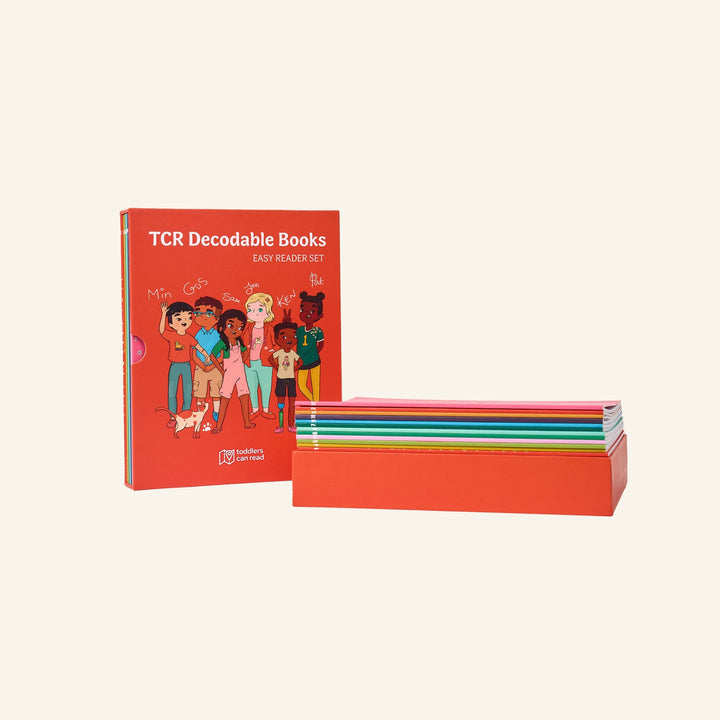Being the parent of a little one means you are constantly being told about new things you should worry about when it comes to your child: Are they eating the right foods? Are they playing with the right toys? Are they crawling/walking/talking/running/jumping/sleeping/breathing (this list could go on forever) the way that they should be?
And while there are definitely things you should be worrying about, whether or not the fact that your child's school is teaching them to read in kindergarten is not one of ahem.
But in a widely-cited article, "Reading Instruction In Kindergarten: Little to Gain and Much to Lose" (Carlsson-Paige et al., 2015), the authors pose this very concern as one worth stressing over. They suggest that teaching reading to children in kindergarten (or before) does very little to help them, and can potentially harm them in the long run.
In this blog post, I'm going to dissect this (false) idea, and explain why how you teach a child to read is much more important than when.
Is this article research?
No. Despite the number of times we've seen this source referenced as scientific evidence against early reading instruction, it is not research. Although the authors included references to research in the report, they themselves did not conduct anything that could be classified as scientific research.
And while the three authors might have impressive careers in early childhood education, their backgrounds are not in research. This is important to note because it gives context as to why these authors misrepresented cited studies (inadvertently or otherwise) in an attempt to bolster their claims.
Another important consideration when evaluating the validity of this report is who it is being written for, and what their motivations might be in publishing this. Defending the Early Years and the Alliance for Childhood, organizations with which the authors are affiliated, both place a heavy emphasis on play and experiential learning and promote policies that support whole-child health. While these are extremely worthwhile things to advocate for, and approaches with which we agree, they also hint at a level of bias against any kind of initiatives involving academic activities for young children. Through this lens, it becomes clear as to why the authors left unconsidered much of the nuance of child development.
Who are the authors?
Nancy Carlsson-Paige is a Professor Emerita at Lesley University and has been a teacher educator in child development for around 30 years. She's also written books on children's play and social emotional development.
Geralyn Bywater McLaughlin is a director of the Defending the Early Years coalition, which is the nonprofit organization that published this report. She was also a founding teacher at the Mission Hill School in Massachusetts, which focused on child-initiated and project-based learning.
Joan Wolsheimer was a well-respected Waldorf early childhood educator for many years, who wrote and lectured about child development, early education, and play-based learning in preschools and kindergartens.
This piece was published by Defending the Early Years, which is a non-profit organization that advocates for play-based approaches to learning. The report was also sponsored by the Alliance For Childhood, which promotes play-based learning as well.
What does the report argue?
This report outlines concerns the authors have about the growing academic expectations put on kindergarteners. They believe the standards kindergarten students are being held to are too rigorous and developmentally inappropriate. Their arguments are primarily based on the three statements below:
#1: Kindergarten Common Core State Standards (CCSS) are too rigorous and don't respect children's developmental timelines.The authors expressed particular concern about students being expected to "read emergent-reader texts with purpose and understanding" by the end of kindergarten. They stated that they were unable to find the research that the CCSS developers used to guide their decisions regarding the standards, but they didn't go into any further detail as to the lengths they went to, to try and uncover this research.
Results of a survey that their own organization, Defending the Early Years, conducted showed that 85% of public school teachers believed they were being required to teach developmentally inappropriate activities. Some of these inappropriate activities included writing words, sentences, and paragraphs and weekly assessments on an excessive number of sight words, letter sounds, and letter names.
The final piece of evidence they used to support their claim was a 2010, 2-year study conducted by the Gesell Institute. The institute used a 19-measure assessment to determine a child's development that required them to look at and draw different shapes. They study used the ages at which the children were able to draw increasingly difficult shapes as an indicator of typical developmental milestones. In evaluating the results, they found that children were meeting these milestones at the same ages in 2010 as they were in 1925—despite a higher standard of academic achievement.
This argument feels all-around weak, considering that CCSS are not a reflection of reading instruction in general.
Saying that reading instruction in kindergarten is developmentally inappropriate because the CCSS are unreasonable is like saying we shouldn't ask a child to dribble a basketball because they wouldn't be able to make a half-court shot.
If the author's concerns were with the level of rigor present in the CCSS, they should have titled their report "Common Core Literacy State Standards in Kindergarten: Little to Gain and Much to Lose." But instead, they went with a more inflammatory title that villanizes early reading instruction by conflating two inequivalent things.
Secondly, their own organization conducted the survey they use as evidence. While this doesn't necessarily invalidate the authors' findings, it's appropriate to wonder if the teachers being surveyed may have been biased.
If you're surveying teachers connected to an organization that advocates for more play in classrooms, it would stand to reason that those teachers already believed the current academic standards are developmentally inappropriate.
And even more concerning is that the authors never actually define developmental appropriateness. Not only is this a term that could be easily misunderstood by someone outside of early childhood education, but also the lines between what is and isn't developmentally appropriate are blurry even among experts. The term has also been criticized for its lack of cultural sensitivity.
Finally, using a study regarding motor skills development (drawing shapes) to make an argument about a child's reading ability makes little sense. The rate of motor development in children is not evidence of their cognitive ability, their reading ability, or the best way to help children understand these concepts.
#2: There is no evidence of long-term gains due to reading instruction in kindergarten versus later in school.The only research to support this specific claim comes from a 2012 paper published by a professor in Germany, Sebastian Suggate, whose doctoral thesis found there were no long-term gains for children whose reading instruction began in kindergarten when compared to students who began reading instruction later.
By now, it should be clear that one single study alone does not provide enough evidence to prove a claim to be true—especially when there is also evidence to the contrary. Relying on one study to make "research-based" decisions regarding early childhood education practices is hazardous.
In fact, the results Suggate found contradict the scientific arguments he cites in his own abstract:
"The main scientific argument in favour of developing early reading skill comprises three strands. The first strand from longitudinal studies shows correlations in reading skills over time, such that struggling readers in kindergarten and first grade are likely to be the lowest performing later on. Second, many cite the positive effects that reading intervention programs for young children have, thereby proposing that these should play a vital role in preschool and kindergarten in reducing disadvantage. In the third strand, Matthew Effects in reading (Stanovich, 1986) are cited, whereby the achievement gap between the better and worse readers is thought to widen over time."
The authors failed to mention how Suggate's data is, by his own understanding, counter to the correlational data previously collected. This may be because it does not align with their narrative.
#3. Play-based learning leads to long-term gains.Yet again, we have an anti-early reading narrative using the Perry Preschool Project as evidence of the benefit of play and the harm of reading instruction for preschool-aged children. The authors state:
"School records indicate that 47 percent of the children assigned to the direct instruction classroom needed special education for social difficulties versus only 6 percent from the play-oriented preschool classrooms. And by age 23, police records showed a higher rate of arrests for felony offenses among those who were previously in the instructional program (34 percent) compared to those in the play-based programs (9 percent)."
The insinuation here is that students were more likely to be recommended for special education services, be arrested, and commit felonies because they were in a Direct Instruction preschool.
Not only is this a complete misrepresentation of the findings, but also it shows a complete misunderstanding of what was actually being studied. We discuss the Perry Preschool Project at length in this previous blog post, so we won't deconstruct the entire study here. But we will highlight what we see as the biggest flaw in the author's use of this research as evidence.
Beyond overlooking the inconsistent methods, the problematic beliefs of the researchers, and the fact that the study is frequently used in support of early learning programs, the authors completely misused the terms play-oriented and play-based as a substitute for what is really a High/Scope preschool model.
The High/Scope model is characterized by:
- carefully catered instruction based on a child's interests and abilities,
- child-initiated learning based on the Plan-Do-Review process,
- an emphasis on social-emotional development that supports social interactions and builds a secure community,
- curriculum that is reflective of the child's community and culture, that also fosters a sense of respect for diversity, and
- strong family engagement through the development of supportive relationships with parents.
So while the High/Scope model undoubtedly includes time for creative play, calling it "play-based" is highly dismissive of the nuance of this model. Furthermore, advocates for the High/Scope model theorize that the benefits of this model come from social-emotional development and community building—not just the incorporation of play.
The authors went on to discuss Marcon's 2002 follow-up study:
"Rebecca Marcon found negative effects of overly-directed preschool instruction on later school performance in a study of three different curricula, described as either 'academically oriented' or 'child initiated.'"
Once again, this summary is misrepresentative of the study's findings. To say that the academically-oriented curriculum had negative effects on later school performance insinuates that the differences in achievement were because the academic instruction was harmful, rather than that the child-initiated model was beneficial. This framing is inaccurate and not at all what Marcon was portraying.
This summary also fails to acknowledge that learning was happening in all three models the original study explored; it was the way in which this instruction was being given that varied. Aside from this, there was no discussion of how the homogeneity of the sample may have played a role in the results, or that there was little control over potentially confounding variables such as variance in curriculum execution, teacher experience, or class size.
The last research the authors cited for this specific claim is a study done in Germany in the 1970s, saying the results showed that by the fourth grade, kindergarteners who attended a play-based program outperformed kindergarteners who did not attend a play-based program.
There are several things that bring into question the credibility of their portrayal of these findings. First off, they failed to actually cite the study itself, but rather a handbook from 1992. Citing a secondary source as evidence is substantially weaker than citing the study itself, because it becomes an interpretation of someone else's interpretation, leaving many things to be lost in translation.
Additionally, you may have noticed that none of the research for this particular claim is less than two decades old, this one being the oldest. If the findings of a study have yet to be continually replicated, it is unreasonable to use them in support of present-day practices.
The study being cited is not only decades old, but it's also from an entirely different country. It's difficult to reach accurate conclusions based on data from another country given potentially confounding variables such as:
- differences in phonemic-orthographic correspondence between languages
- typical methods of instruction
- the quality of public education
- cultural and family attitudes towards learning
- wealth gaps and average economic status
- availability of resources
... and many, many other factors. Including this study as evidence against early reading instruction in the United States means ignoring all of these variables that might negate the data's relevance.
Lack of Perspective
On top of their misguided interpretation of academic literature, Carlsson-Paige et al. argued that children who haven't had first-hand experiences with different environments might not be able to understand those environments when they read about them in books:
"For children who have not experienced gardens or farms, forests or parks, supermarkets or a host of other public spaces, references to them in books can be puzzling."
This claim in particular makes us question the authors' expectations of and belief in children in general.
To think that children are incapable of understanding things simply because they don't have real-life experiences with them is to assume very little of their cognitive abilities.
Plus, children read about fictional worlds all the time (where there are dragons or princesses or sentient vehicles that talk). Despite never being able to actually experience those things, they are very well able to initiate independent play in these imaginary environments, showing an interest in the made-up worlds they've read about.
Worse than this illogical leap, though, is how out of touch this argument is with children and families whose lived experiences do not mirror the authors'. In a perfect world, all children would be able to attend field trips to farms, parks, and forests. But for many students in this country, those experiences are not accessible. Whether because of economic or geographical or physical limitations, there are many children who don't have those same opportunities.
And for a lot of those same children, books open up inaccessible places. Maybe they can't visit a farm on a field trip, but they can learn an awful lot through reading about it. How devastating would it be if children were truly only able to learn about the world through lived experiences?
This failure to consider the role that privilege plays in a child's educational experience is extremely disappointing, and we sincerely hope that this message doesn't discourage parents who use books to make the world accessible to their children.
Goes From One Extreme To Another
Despite our criticisms of this source, we at Toddlers Can Read hold many beliefs in common with the authors. We also believe in the importance of play and in giving children space to develop socially and emotionally at a young age.
However, our disagreement with the authors stems from their desire to move from one extreme to the other. In believing that the current academic standards for kindergarten are too rigorous, they have somehow come to the conclusion that any amount of academic instruction will harm young children.
But is there not a world in which kindergarteners can spend 5-10 minutes a day working on phonics and still have ample time to play and develop social skills? Or better yet, a world in which they can spend 5-10 minutes a day working on phonics through play?
Can we acknowledge the fact that any potential harm in early reading instruction would almost certainly come from a lack of sensitivity to what's developmentally appropriate—both in lesson duration and type of instruction—rather than the inclusion of instruction in the first place?
When it comes to the debate around early reading instruction, there's no reason to believe that kindergarteners can either focus on academic skills or play; these two facets of early childhood education are not mutually exclusive and more than likely work better in tandem.
What's the bottom line?
Three early childhood educators (with no evident research experience) published "Reading Instruction In Kindergarten: Little to Gain and Much to Lose" for a non-profit organization that advocates for play. The research they use to support their belief that reading instruction in kindergarten might harm children is unavoidably weak and either misrepresents findings or explains findings without nuance. Any reasons they suggest to decrease the rigor of current kindergarten academic standards do not justify removing any amount of academic instruction entirely.
TL;DR: Citing research out of context can fuel the spread of misinformation. An argument that pushes for one extreme over another is probably equally unreasonable.









